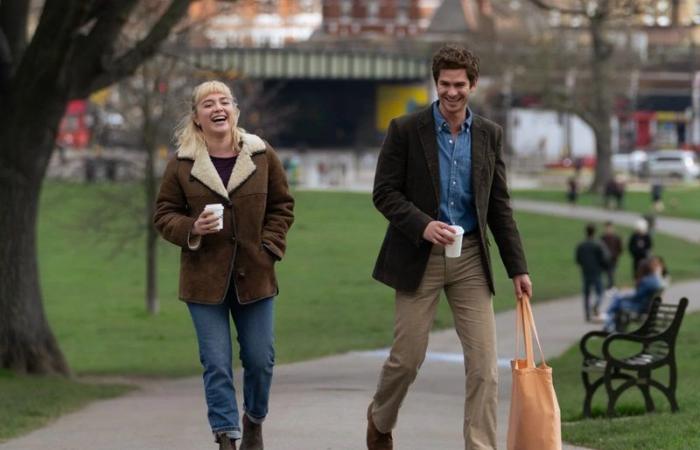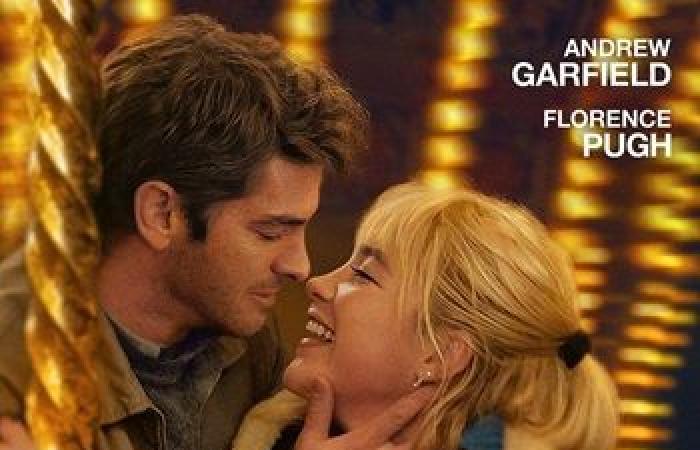We Live In Time (Love in the present), released on January 1, is it the first “big film” of 2025? It's a question worth asking, because while it's easy to make fun of “cinema romances”, its subtlety and interpretation make it a work “apart.” And a very beautiful moment of emotion.
There are probably not many people among the moviegoers of 2025 who remember, or who have even seen Love Storythe film of Arthur Hillerdating from 1970, which told a tragic “love story” due to its heroine's leukemia: this film was nevertheless one of the biggest popular successes of its time, and, even if it was regularly mocked by the critics, who found it too “obvious” in its description of a “perfect” romantic relationship – carried by two very “beautiful” actors, Ali MacGraw et Ryan O’Nealit deeply shocked audiences around the world. Because of the similarity of its subject – a great love story endangered by the arrival of cancer – we can fear that Love in the present does not experience a similar fate: a great popular success (although in our time where cynicism reigns supreme, are we as ecstatic about the strength of the feeling of love?), but a rapid exclusion from the “memory” of critics , movie buffs and Cinema in general. However, the new feature film John CrowleyEnglish director best known for Brooklyna “sensitive” but rather cautiously academic film, seems to us to be worth not only seeing, but also defending.
Because, unlike Love Story – Or Hiller had a heavy hand at times – here is a film which upsets without any fuss. And unlike Brooklynpretty but innocuous, we have the feeling when leaving the cinema that Love in the present will have imprinted on us deep, lasting sensations. So yes, a well-done Marketing campaign tells us about We Live in Time (the original title of the film, relevant to the subject, while the French title is in fact a misinterpretation) as a “luminous and melancholic” work, “carried by striking performances by Florence Pugh et Andrew Garfield“. Which is not false, but does not point out what is important here, that is to say the mysteries of time, the games of memory in relation to the vagaries of life and the whims of destiny. And above all the trace that we leave in the existence of others… A unique trace, even if it is ultimately only learning how to “properly” crack eggs when preparing a cake.
Or, at first glance, We Live in Time might seem content to tell a classic romance, a banal “Boy Meets Girl”. Stephen is an executive at Weetabix, a British breakfast cereal company: above all, he is a man as rational and down-to-earth as he is tormented. He accidentally (literally) crosses paths with Alice, a young chef who is quickly climbing the steps of success and recognition in the world of gastronomy. She is luminous, dynamic, combative, vibrant, funny, but hides her own cracks. Their paradoxical love at first sight, then their relationship, which began in a light and nicely trivial tone, takes place following the “usual” stages of building a couple, then a life with a child, in the middle well-off of the white British bourgeoisie. But we quickly realize that what distinguishes We Live in Timeit is his refusal of the conventions of the genre (it is therefore a sort of anti-Love StoryIn fact). We don't dwell on grandiose gestures or romantic clichés, but we focus on the small details, on those fleeting and universal moments that form the fabric of our existence: a smile, a look, a hesitation, everything that does not necessarily imprint memory but constitutes the essence of our humanity…
… Until the shift represented by the arrival of the illness, which threatens the couple, and projects them towards something else: a poignant exploration of what we lose, of what we will regret, and above all of what will remain, despite everything. The excellent idea of Crowley and its screenwriter Nick Payneis not to move linearly from romantic comedy to tearful melodrama, but to choose a fragmented narrative structure, which can reflect the themes of the film: by playing with time and memories, but in a fluid way (reassure -you, even if the spectator must make efforts to piece together the puzzle of the story that is told to him here in disorder, he is never “lost”), Crowley invites us to question the way we shape our lives through our choices and our renunciations. Above all, We Live in Time avoids easy answers, preferring to give us the freedom to draw our own conclusions… And therefore, also, the freedom to reflect on our own existence, our own decisions.
Even though we are going to repeat the film's marketing comments here, it is necessary to highlight the astonishing on-screen chemistry between Florence Pugh et Andrew Garfieldwho give life to a couple who, most of the time, do not need words to exist. We already knew that Pugh was a great actress, fascinating even in her less good films: she impresses once again with her ability to convey a very wide range of emotions with naturalness and simplicity. Garfieldof whom we will generously forget the Spider-man that he was, was revealed late, from the Silence of Scorsesebut especially from the series Under the Banner of Heaven : he delivers here one of the most delicate performances of his career. His disarming vulnerability makes every moment he is on screen a heartfelt and moving experience.
And We Live in Time is unfortunately not the masterpiece that it could have been, it is that John Crowley abuses here and there almost “advertising” images in the description of what the happiness of being in love, of living together, of starting a family is: while its scenario, its dialogues and its performers elegantly avoid all stereotypes that we feared, the settings, the light, the image in general do not have the same intelligence.
But it's not a tragedy, because despite these few slags, We Live in Time resonates in us long after the final credits: it invites us to embrace our life in all its complexity, in all its sadness and its beauty.
![]()
Eric Debarnot








